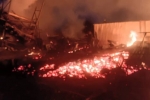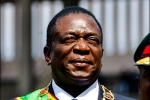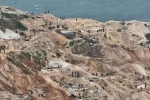International pressure is mounting for the Zimbabwe government to respect labour rights following condemnation by the International Trade Union Confederation (ITUC). ITUC launched a global solidarity campaign in support of the ZCTU on the 4 of February demanding that government stop harassment of trade unions, withdraw criminal charges, amend draconian laws.
In a letter to President Emerson Mnangagwa, ITUC's General Secretary, Sharan Burrow condemned Mnangagwa's administration for suppressing workers' rights and demanded that the state withdraws criminal charges against trade unionists.
“I am writing on behalf of the ITUC representing 207 million workers in 163 countries including Zimbabwe to strongly condemn the continued harassment and judicial persecution for trade unionists in your country for carrying out their legitimate trade union activities,” she said.
Burrow questioned why the case of 19 Zimbabwe Congress of Trade Unions (ZCTU) activists who were arrested in Mutare in October 2018 for staging a demonstration against government’s unpopular introduction of a 2% tax on electronic transactions had not been finalised over such a long period of time when other activists including ZCTU President Peter Mutasa and Secretary General, Japhet Moyo who were instrumental in organising the demonstration, and were arrested on the same charges were acquitted last year.
The Mutare activists have appeared in court 11 times had their case postponed to February 24, 2020 at their last appearance on 4 February. Court officials said the trial magistrate was out of town hence the trail could not continue.
“We are also concerned that Thomas Masvingwe who leads the National Energy Workers Union of Zimbabwe is still facing criminal charges arising from the 2018 demonstration. Another activist who is the ZCTU secretary general, John Chirenda remains dismissed by the Zimbabwe Revenue Authority,” she said.
Masvingwe was arrested for leading a demonstration against the Zimbabwe Electricity Supply Authority over non implementation of the sectors 2012 Collective Bargaining Agreement while Chirenda was dismissed for alleged insubordination.
Burrow said the unions the world over were also worried about the economic decline in Zimbabwe which have resulted in spiralling cost of living triggered by impractical economic policies. She demanded the immediate amendment of the Criminal Law Codification and Reform Act, Maintenance of Peace and Order Act, the Labour Act, the Public Service Act and the Health Services Act among other statutes.
The ITUC successfully called for the global day of action on February 4, 2020 to lobby the Harare administration to withdraw all criminal charges against the activists. The Zimbabwe government has been found on the wrong side of labour law by the international community.
In 2009 the International Labour Organisation dispatched a Commission of Inquiry to Harare to investigate systemic and systematic use of the state repressive apparatus, the police and army in suppressing workers' strikes, interference in trade union affairs by government and lack of judicial independence that had been raised by the ZCTU. The commission found the Zimbabwe government guilty of violating workers' rights.
It said “The commission sees a clear pattern of arrests, detentions, violence and torture by the security forces against trade unionists that coincided with ZCTU nationwide events, indicating that there had been some centralised direction to the security forces to take such action”. The Commission recommended:
- Harmonisation of Labour Laws.
- A stop to all anti-union practices.
- Establishment of a Human Rights Commission.
- Training of security forces on Freedom of Association and liberties and Human rights.
- Training of judicial officers on Freedom of Association and Liberties, human rights and of adequate resources to courts. ·
- Strengthen Social Dialogue.
- Provision of technical assistance by ILO.
In over a decade, after the recommendations, there remain some grey areas and visible trends of regression. The government has not shown any seriousness towards a biding by the ILO recommendations and sometimes acts in bad faith at the eleventh hour towards the annual ILO General Conference.
In 2016 the ZCTU reported serious violations against the government which included a police crack down on a ZCTU demonstration in which workers were demanding the payment of their salaries. On 8 August 2015, police besieged the ZCTU offices in Harare, arresting trade union leaders in order to stop an announced demonstration clearly imposing practical restrictions on workers' rights.
In 2018 the military shot at the ZCTU offices in Harare in an operation that killed 6 people in the streets of Harare as it quashed demonstrators who were calling on the Zimbabwe Electoral Commission to speedily announce the 2018 Presidential Election results.
Last year Zimbabwe was listed among the top ten labour violators by the ITUC. The listing came on the backdrop of a brutal crackdown on ZCTU leaders for calling for the January 2019 stayaway. Government reacted by deploying the military resulting in more than 16 people dying with thousands arrested and injured during the military crackdown.








Leave a comment